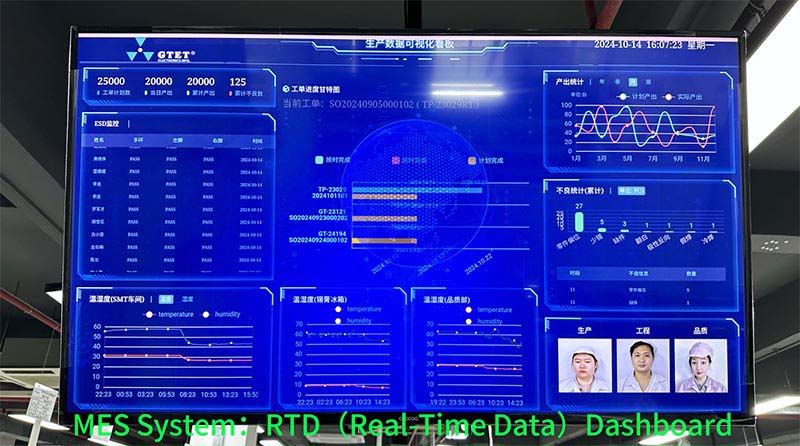In the PCB assembly (printed circuit board assembly) industry, production planning capability is one of the key factors in determining whether a factory can effectively respond to market demand and improve production efficiency. From the supply chain point of view, production planning is not only the organisation and scheduling of the production process, but also involves material management, production capacity assessment, supplier management and other aspects of coordination. Effective production planning can ensure that PCB assembly manufacturers in the premise of quality assurance, to meet customer demand and optimise resource allocation.

1、Materials management and inventory control: accurate forecasting and efficient allocation
Material management is the core of PCB assembly production planning. In the face of complex and diverse demand for raw materials, an efficient PCB assembly manufacturer must have the ability to accurately forecast material demand. Through advanced MRP systems, manufacturers can accurately forecast material demand and make reasonable procurement plans accordingly. At the same time, close co-operation with suppliers ensures timely supply of raw materials and avoids production stoppages due to lack of materials.
In terms of inventory management, manufacturers need to establish an accurate inventory control system to maintain a reasonable inventory level. Excessive inventory ties up capital and increases costs, while insufficient inventory can lead to production interruptions and affect deliverability. Through close collaboration with the upstream and downstream of the supply chain, manufacturers are able to achieve accurate deployment of materials and ensure the smooth execution of production plans.
2、Capacity Assessment and Resource Allocation: Real-time Monitoring and Dynamic Adjustment
Production capacity assessment is the key to evaluating the production planning ability of PCB assembly manufacturers. Manufacturers need to regularly assess production capacity, including production line capacity, equipment utilisation and human resource allocation. With a digital management system, manufacturers can monitor the operating status of their production lines in real time, identify potential bottlenecks and resource shortages, and make timely adjustments and optimisations.
In response to changes in market demand, manufacturers need to flexibly adjust their resource allocation and improve the utilisation of their production lines. This not only optimises the production process and reduces production costs, but also improves delivery speed and enhances market competitiveness.

3、Supplier management and co-operation: stable cooperation and rapid response
In the PCB assembly process, suppliers play a crucial role. Manufacturers need to establish a long-term stable relationship with suppliers to ensure the quality of raw materials and delivery. This stable partnership helps manufacturers to reduce procurement risks and improve supply chain reliability.
Supplier flexibility and responsiveness are also important factors in assessing a manufacturer’s production planning capabilities. When market demand or production plans change, manufacturers need to communicate quickly with suppliers and adjust supply strategies. This rapid response capability helps manufacturers maintain stable production capacity in changing market conditions.
4、The flexibility of the production plan and emergency management: rapid adaptation and stable delivery
With the rapid changes in market demand, PCB assembly manufacturers need to have a high degree of flexibility in production planning. Manufacturers need to reserve a certain amount of buffer space in the production plan to respond to unexpected changes, such as an increase in the number of orders, delayed supply of raw materials and so on. Through the establishment of emergency management mechanism and flexible scheduling system, manufacturers can quickly adjust the production plan to ensure on-time delivery and maintain customer satisfaction.
5、Data-driven production planning: intelligent forecasting and optimised decision-making
In the context of Industry 4.0, data-driven production planning has become an important option for PCB assembly manufacturers. Through big data analytics, manufacturers can obtain real-time information on the dynamics of production, supply chain and market demand to optimise production planning. Data-driven production planning helps manufacturers accurately predict future changes in demand and optimise the allocation of resources and capacity based on historical data.
At the same time, real-time monitoring and analysis of data enables manufacturers to make timely adjustments to production plans, optimise production processes, improve overall production efficiency and reduce production costs. This ability to make intelligent predictions and optimised decisions helps manufacturers stay ahead of the curve in a competitive market.
Evaluating a PCB assembly manufacturer’s production planning capability from a supply chain perspective is a comprehensive evaluation process that involves material management, capacity assessment, supplier management, production planning flexibility and data-driven decision-making. An excellent PCB assembly manufacturer should have accurate production planning capabilities to continuously improve its market competitiveness by optimising resource allocation, improving production efficiency and ensuring on-time delivery. With the ever-changing market demands and the continuous development of technology, PCB assembly manufacturers need to continuously innovate and improve their production planning capabilities in order to adapt to the challenges and opportunities of the future.


